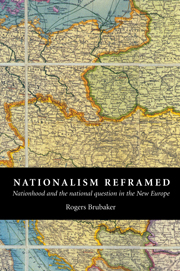Book contents
- Frontmatter
- Contents
- Acknowledgments
- Introduction
- Part I Rethinking nationhood and nationalism
- 1 Rethinking nationhood: nation as institutionalized form, practical category, contingent event
- 2 Nationhood and the national question in the Soviet Union and its successor states: an institutionalist account
- 3 National minorities, nationalizing states, and external national homelands in the New Europe
- Part II The old “New Europe” and the new
- Bibliography
- Index
2 - Nationhood and the national question in the Soviet Union and its successor states: an institutionalist account
Published online by Cambridge University Press: 06 July 2010
- Frontmatter
- Contents
- Acknowledgments
- Introduction
- Part I Rethinking nationhood and nationalism
- 1 Rethinking nationhood: nation as institutionalized form, practical category, contingent event
- 2 Nationhood and the national question in the Soviet Union and its successor states: an institutionalist account
- 3 National minorities, nationalizing states, and external national homelands in the New Europe
- Part II The old “New Europe” and the new
- Bibliography
- Index
Summary
The Soviet Union has collapsed, but the contradictory legacy of its unique accommodation to ethnonational heterogeneity lives on. That accommodation pivoted on institutionalized multinationality. The Soviet Union was a multinational state not only in ethnodemographic terms – not only in terms of the extraordinary ethnic heterogeneity of its population – but, more fundamentally, in institutional terms. The Soviet state not only passively tolerated but actively institutionalized the existence of multiple nations and nationalities as fundamental constituents of the state and its citizenry. It established nationhood and nationality as fundamental social categories sharply distinct from the overarching categories of statehood and citizenship. In so doing, it prepared the way for its own demise. For the institutional crystallizations of nationhood and nationality were by no means empty forms or legal fictions, although this was how they were viewed by most Sovietologists. Institutionalized definitions of nationhood, I argue in this chapter, not only played a major role in the disintegration of the Soviet state, but continue to shape and structure the national question in the incipient successor states.
The chapter is in two parts. The first part discusses the dual legacy inherited by the successor states from the Soviet encounter with the national question. It focuses on the two very different modes in which nationhood and nationality were institutionalized in the Soviet Union – territorial and political on the one hand, ethnocultural and personal on the other hand.
- Type
- Chapter
- Information
- Nationalism ReframedNationhood and the National Question in the New Europe, pp. 23 - 54Publisher: Cambridge University PressPrint publication year: 1996
- 7
- Cited by



